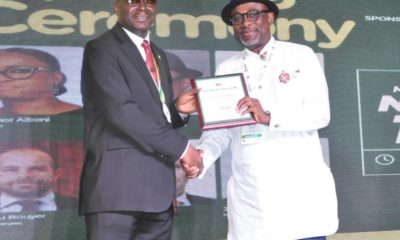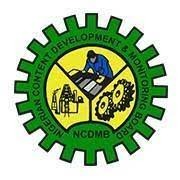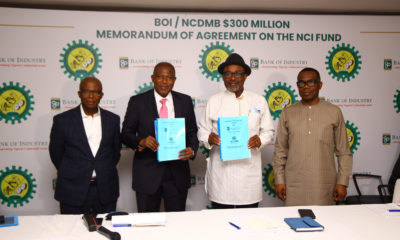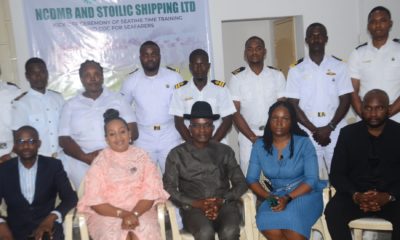Energy
NCDMB and Partners to complete 4 projects in Q4 2021
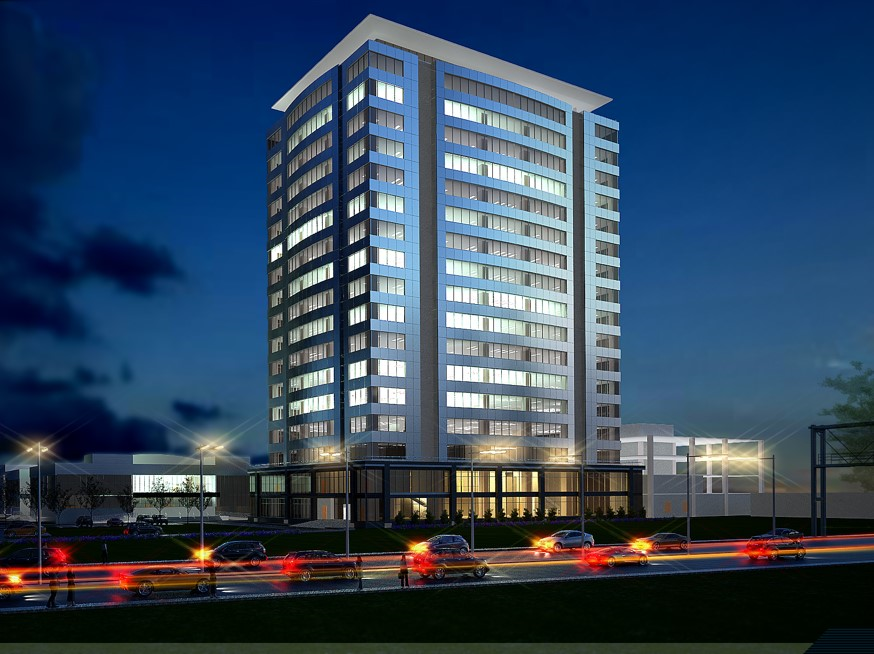
Modupe ASUDO
ABUJA– FOUR major projects being developed by investors in partnership with the Nigerian Content Development and Monitoring Board (NCDMB) would be completed before the end of 2021, the Executive Secretary NCDMB, Engr. Simbi Kesiye Wabote has disclosed.
The projects include the Rungas facility in Polaku, Bayelsa State that would manufacture 400,000 units of Composite LPG Cylinders per annum and BUNORR production plant in Port Harcourt, Rivers State, which would produce 48,000 litres of base oil per day.
The other two projects include NEDO Gas’ 80 million standard cubic feet per day gas processing facility upgrade and expansion, plus 300 million standard cubic feet per day KGG manifold in Delta State, and DUPORT Midstream Ltd’s Energy Park, which comprises 2,500 barrels of crude oil per day modular refinery, 40 million standard cubic feet per day gas processing plant and 2 megawatts power plant.
The Executive Secretary spoke on Thursday in Abuja at the one-day workshop on the “NCDMB Roadmap, A Catalyst for the Industrialization of Nigeria 2017-2027,” organised by the Reform Coordination and Service Improvement Department of the Ministry of Petroleum Resources.
He also said that five Liquified Petroleum Gas (LPG) storage/bottling plants and six LPG Depots being developed in partnership with Butane Energy Limited in 10 states in the North and Abuja would be completed in two phases – six in quarter 1 of 2022 and the rest in quarter 4 of 2022, with the opportunity to create 1,900 direct, indirect, and induced jobs.
Wabote also hinted that the Board was partnering with the Lagos Deep Offshore Logistics Base (LADOL) to develop a 24 megawatts power plant at Takwa Bay, Lagos State to provide uninterrupted power supply to the free zone which hosts key facilities required to service the oil and gas industry. The project is expected to generate 400 jobs.
According to him, the Board’s partnership investments cut across modular refineries, LPG value chain, and other areas. He stated that that the Board had 23 project sites spread across Abuja, Bayelsa, Bauchi, Delta, Edo, Gombe and Imo State. Other locations include, Jigawa, Kaduna, Katsina, Kano, Lagos, Nasarawa,Niger Plateau, Rivers, and Zamfara states.
The NCDMB boss explained that the Board committed equity investments into strategic projects that align with Government’s policies with a view to catalysing them to success and would exit once those businesses become successful. The investments were also in line with the Board’s vision “to be a catalyst for the industrialization of the Nigerian oil and gas industry and its linkage sectors,” he added.
Commenting on the functions of NCDMB and the Nigerian Content 10-year Strategic Roadmap, Wabote reported that the Board had recorded considerable progress with the implementation of the roadmap and had grown Nigerian Content from 26 percent to 35 percent within four years and was on track to achieve 70 percent by 2027.
On the US$350m Nigerian Content Intervention Fund, which provides affordable and accessible credit to qualified oil and gas companies, he described it as one of the most successful funding schemes in the country, hinting that the repayment rate by beneficiaries has been 99 percent.
In his comments, the Permanent Secretary, Ministry of Petroleum Resources, Dr. Nasir Sani Gwarzo lauded NCDMB for its achievements, adding that the Board was on the right trajectory in implementing it mandate and impacting linkage sectors. He charged the Executive Secretary to remain committed to the same trajectory of deepening Local Content implementation for the benefit of the economy and Nigerians.
He said the workshop was the first edition of enlightenment series conceived to educate personnel in the ministry on the operations of agencies under the ministry. He promised to deliver a report on the workshop to the Head of Service of the Federation and expressed hope that other ministries would inaugurate similar programmes and use them to build an informed and reformed civil service.
Energy
Nigeria’s Gas Output Increases By 2.9%, Reaching 2.29 MSCF

Amid a slight increase in gas production, Nigeria’s oil output experienced a substantial rise in November 2024.
Gas production saw a 2.9% month-on-month (MoM) increase, reaching 2,292,951 million standard cubic feet (MSCF) from 2,292,471 MSCF in October.
However, on a year-on-year (YoY) basis, the growth was minimal, with a mere 0.02% increase in output for the first 11 months of 2024, compared to the same period in 2023.
READ MORE: Tinubu Mourns Ex-U.S. President Jimmy Carter, Celebrates His Legacy
The latest gas report from the Nigerian Upstream Petroleum Regulatory Commission (NUPRC) also revealed a 1.6% increase in domestic gas consumption.
A total of 606,658 MSCF was consumed locally, compared to 596,861 MSCF during the same period in 2023. Gas exports, meanwhile, rose by 6.9%, reaching 829,156 MSCF, up from 775,547 MSCF in the corresponding period of 2023.
This growth in exports continues to play a vital role in bolstering Nigeria’s foreign exchange earnings.
Despite these positive figures, sources close to the Ministry of Petroleum Resources (Gas) noted that oil remains the dominant force in Nigeria’s energy sector, with gas taking a secondary role.
On the other hand, the NUPRC’s oil production report revealed a remarkable surge.
Nigeria’s oil output, including condensates, rose by 13.3% year-on-year in November 2024, reaching 1.7 million barrels per day (bpd), up from 1.5 million bpd in November 2023. Month-on-month, oil production also increased by 10%, from 1.5 million bpd in October 2024.
Dr. Muda Yusuf, CEO of the Centre for the Promotion of Private Enterprises (CPPE), discussed the broader structural dynamics within Nigeria’s economy, highlighting the dominance of the non-oil sector.
In his 2025 Outlook, Dr. Yusuf noted that the non-oil sector contributed 94.43% to Nigeria’s GDP in Q3 2024, while the oil sector accounted for just 5.57%.
“However, the economy is characterized by a paradox of the oil sector contributing an estimated 90% of foreign exchange earnings, while the non-oil sector accounts for about 10%,” Dr. Yusuf said.
“This is a structural shortcoming in our economy which needs to be addressed, as sectors that contribute hugely to GDP have no corresponding contribution to foreign exchange earnings.”
He further emphasized the need to address the challenges faced by the non-oil sector, which include issues related to productivity, infrastructure, funding, and regulatory constraints.
“The policy implication is that more should be done to fix the challenges of productivity and competitiveness of the non-oil sector of the economy,” Dr. Yusuf added
Energy
JUST IN: NNPC Ltd Reopens Warri Refinery

The Nigerian National Petroleum Company Limited (NNPC Ltd) has announced that the 125,000-barrel-per-day Warri Refining & Petrochemicals Company (WRPC) in Warri, Delta State, has become operational.
This is coming about a month after the commencement of operations at the 60,000-barrel-per-day-old Port Harcourt Refinery.
The Group Chief Executive Officer, NNPC Ltd, Mele Kyari, made the disclosure during a tour of the facility on Monday.
ALSO READ: SERAP Urges Tinubu To Direct CCB To Publish President’s, VP’s, Others Assets
A video posted by Channels TV on Monday showed Kyari addressing a tour team, which included the Chief Executive Officer of the Nigerian Midstream and Downstream Petroleum Regulatory Authority (NMDPRA), Farouk Ahmed.
Before the tour commenced, Kyari explained that the inspection aimed to show Nigerians the level of work completed so far.
According to him, although the repairs on the facility are not yet 100 per cent complete, operations have commenced.
He said, “We are taking you through our plant. This plant is running. Although it is not 100 per cent complete, we are still in the process. Many people think these things are not real. They think real things are not possible in this country. We want you to see that this is real.”
Located in Ekpan, Uwvie, and Ubeji, Warri, the petrochemical plant produces 13,000 metric tonnes per annum (MTA) of polypropylene and 18,000 MTA of carbon black.
Commissioned in 1978 and managed by NNPC Ltd, the WRPC was built to supply markets in the southern and southwestern regions of Nigeria.
The mechanical completion of the facility was initially scheduled for the first quarter of 2024, according to the Spokesperson of the NNPC Ltd, Olufemi Soneye.
“Warri should be done by Q1 (first quarter) 2024,” Soneye stated.
The WRPC is one of Nigeria’s four refineries. Others include the old and new Port Harcourt Refining Company in Rivers State and the Kaduna Refining and Petrochemical Company in Kaduna State.
Energy
Dangote Partnership: MRS Urges Nigerians To Insist On N935/Litre Petrol Price Nationwide

MRS Oil Nigeria Plc, a prominent player in the Nigerian downstream oil industry, has implemented a new petrol price of N935 per litre across all its retail service stations nationwide.
The company has also called on Nigerians to monitor and report any outlets that fail to adhere to the new price structure.
Biztellers reports that this is consequent upon an announcement by the President of Dangote Industries Limited, Aliko Dangote, that the Dangote Petroleum Refinery has partnered with MRS Oil and Gas to offer petrol at N935 per litre at retail outlets, following a reduction in the ex-depot price from N970 to N899.50 per litre.
ALSO READ: Dangote Slashes PMS Price To N899.50k
It was gathered that MRS Oil Nigeria Plc has instructed all its outlets to implement the new price immediately, setting up a digital platform and monitoring team to ensure full compliance.
In a statement on Monday night, the company declared, “Petrol is now being sold at N935 at MRS Filling Stations nationwide. If you find any station not following this price, please report it. Call 08009447853 or email: NG-FMKPMGWHISTLEBLOWING@NG.KPMG.COM”
Emphasising the eco-friendly nature of its products, MRS Oil added, “We call on all petrol station owners to join MRS Oil Nigeria Plc in improving the supply chain of our beloved country, ensuring product quality and availability in every corner of Nigeria for the benefit of all Nigerians.”
In Lagos, commuters were seen queuing at MRS filling stations to purchase petrol, with many expressing their gratitude to the Dangote Petroleum Refinery and MRS Oil and Gas, urging other marketers to support the indigenous refinery rather than import off-spec products into the country.
A commuter at the MRS station at Alapere on the Lagos Ibadan Express way, Ibukun Phillips, could not hide her joy as her husband filled up their car.
“I am very happy today. This is a victory for Nigeria,” she said. “The price reduction is the best gift of the season. But beyond just the reduction, we are buying standard, eco-friendly petrol at a lower rate. My husband and I have decided we will only be using MRS from now on because we are confident in the quality of the product and supporting the economy.”
A commercial bus driver, Adio Ajibade described the price reduction as a great relief, especially during the festive season.
“The reduction is a great relief. It will reduce transportation costs and benefit Nigerians. God will continue to bless Alhaji Aliko Dangote,” he said.
A public affairs analyst and university lecturer, Dr. Tunde Akanni, said the collaboration between Dangote Petroleum Refinery and MRS Oil represents a significant step towards improving the affordability, quality, and sustainability of petroleum products in Nigeria.
According to Dr. Akanni, “this move will not only help ease the financial burden on Nigerians but also promote a more environmentally conscious approach to fuel consumption, benefitting both the economy and public health in the long term.”

